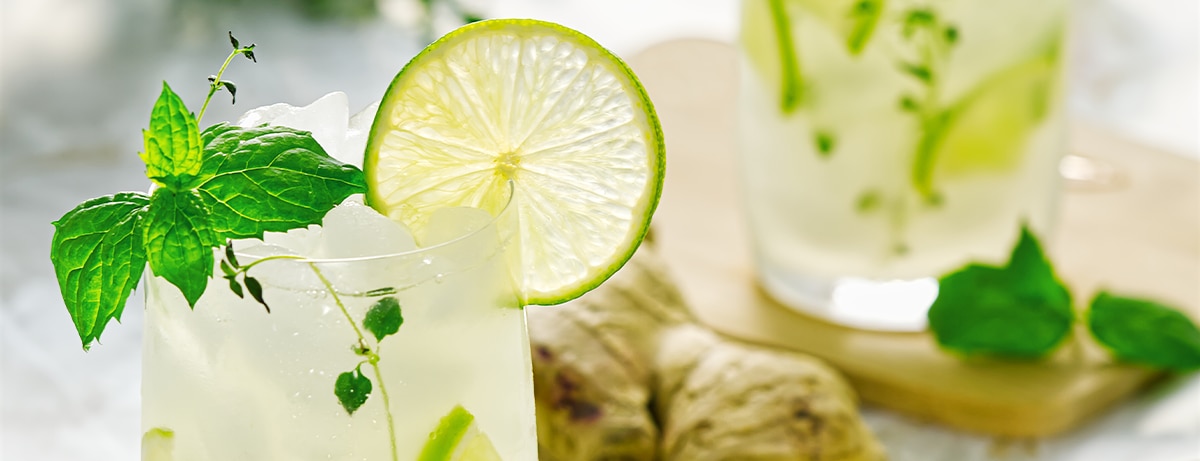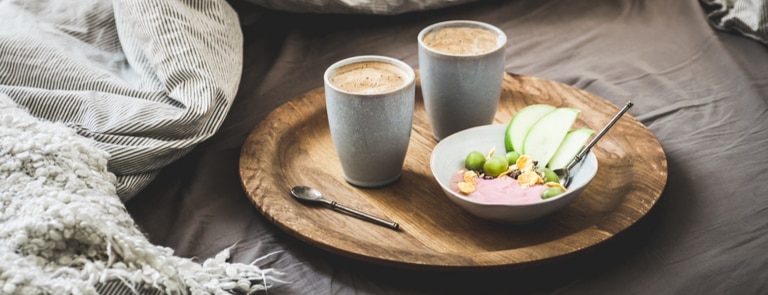15% off €30 or 20% off €40
Code:CHOOSE
Prebiotics, probiotics & postbiotics: A guide

Prebiotics, probiotics and postbiotics... what's the difference? Find out exactly what they are, what they do and how to get more of them, right here.
Summary
1What are prebiotics?
These are defined as a group of nutrients that feed your gut microbiota, and they’re also degraded by it.
2What are probiotics?
Probiotics are live microorganisms that, when taken in the right amount, can provide health benefits for your body.
3What are postbiotics?
Postbiotics are by-products. They are bioactive compounds created by probiotic bacteria when they have consumed fibre or prebiotics.
Your stomach is incredibly important – and no, we’re not talking about how toned your abs are! There’s a whole new area of research dedicated to how the health of your gut can affect the rest of your body.
One of the most interesting research areas is on prebiotics and probiotics, sometimes referred to as ‘friendly’ bacteria.
You might not know it, but deep within your digestive system, there’s 100 trillion bacteria living in your gut. Unfortunately, poor diet, too much alcohol, antibiotics, hormones and stress can all upset the natural balance of this bacteria.
In fact, it’s thought that 4 in 10 of us are experiencing a digestive problem at any one time.1
From stomach aches to indigestion, gut troubles can be incredibly uncomfortable. So, it’s unsurprising we often see new diets, products, or lifestyles that promise a healthier gut.
But as well as pre and probiotics, there are also postbiotics.
So, what’s the difference between prebiotics and probiotics? And where do postbiotics come into the mix? Find out all you need to know about these 3 biotics below.
What are prebiotics?
Let’s get started with the basics of prebiotics. These are defined as a group of nutrients that feed your gut microbiota, and they’re also degraded by it – but this isn’t a bad thing.
The products that are made as a result of this degradation are released into your blood stream, where they can benefit your overall health.2
Different types of prebiotics
There are various types of prebiotics, but most of them are a subset of carbohydrates.2 The most common prebiotics include:
- Fructans – like inulin and fructo-oligosaccharides (FOS), which may be able to stimulate lactic acid bacteria and other bacterial species
- Galacto-Oligosaccharides – stimulate two key types of friendly bacteria, Bifidobacteria and Lactobacilli
- Starch and Glucose-Derived Oligosaccharides – a kind of resistant starch that produces a high rate of butyrate (a short-chain fatty acid) which benefits our health
What do prebiotics do?
Prebiotics can change the composition of your gut microbiome for better. For example, consuming prebiotics has been shown to support the immune system by increasing the number of protective microorganisms.
As well as this, studies have shown that they can even decrease the number of harmful microorganisms, too.2,3
5 prebiotic foods
Fortunately, you can up your prebiotic intake through your food choices. Some of the best sources of prebiotics include:
- Chicory root – 68% of its fibre comes from inulin4
- Garlic – promotes the growth of bifidobacteria5
- Onions – a good source of inulin and FOS6,7
- Artichoke – also rich in inulin8
- Dandelion greens – another source of inulin fibre9
What are friendly bacteria (also known as probiotics)?
Probiotics – which we call friendly bacteria – are live microorganisms that, when taken in the right amount, can provide health benefits for your body.10
They usually come as supplements, although they can be added to food and drinks too.11
Different types of probiotics
While they’re often known simply as ‘probiotics,’ there are a lot of different types. The most common probiotics typically include:
- Lactobacillus – usually added to yoghurts and cheese, as well as found naturally in fermented foods12
- Bifidobacterium – usually added to yoghurts and cheese, or found naturally in some fermented food or live yoghurts13
You can also find these probiotics in over-the-counter supplements, capsules, powders, and drinks.
What do probiotics do?
'Probiotics' or friendly bacteria can help to maintain a healthy balance in your body. Certain types of probiotics can help to aid digestion and improve some stomach-related health concerns.14

Natural ‘good’ bacteria work to keep you healthy all the time, but supplementing might help address other concerns, especially after you’ve been ill.15
It’s important to note that different strains of bacteria may have specific benefits on certain conditions, whereas others may not. Not all benefits can be delivered by one product or food.
8 probiotic foods
There are plenty of ways to include more friendly-bacteria foods into your diet. These might have ‘probiotic’ on the label or include ‘live-cultured’ or ‘active cultures’ too.
Some probiotic or friendly-bacteria food includes:
- Live yoghurt
- Some cheeses
- Kefir
- Uncultured buttermilk
- Kimchi
- Kombucha
- Sauerkraut
- Fermented olives
There are also probiotic supplements available, which can be taken as a capsule, tablet or powder. If you’re thinking about taking a probiotic supplement, it’s worth talking to your doctor or a specialist.
There are a lot of different probiotics on the market, and not all of them will be right for you.16
Like when taking any new supplement, be aware of the potential side-effects and stop if you notice anything untoward.
Generally, probiotics are thought to be safe to consume for people with healthy immune systems.
The safety of probiotics is also under-researched, so we don’t know exactly how many possible side-effects there could be.
However, if you’re in good health, they could be a safe addition to your diet.17
If you have any concerns about whether you should take a probiotic, speak to your doctor.
What are postbiotics?
First things first, let’s define what postbiotics actually are.
While probiotics are gut-friendly bacteria, postbiotics are by-products of these bacteria. They are bioactive compounds created by probiotic bacteria when they have consumed fibre or prebiotics.18
What do postbiotics do?
Our expert nutritionist Alex Glover explains:
“Postbiotics are compounds produced as the end product of our good bacteria fermenting prebiotic fibres. Compounds such as lactic acid, butyrate and other short-chain fatty acids help to maintain intestinal pH, mucosa, and are being researched for a variety of other beneficial physiological functions.”
How to get postbiotics from your diet
Unfortunately, postbiotics are harder to get your hands on when compared to of pre and probiotics.
Specific health food shops or online retailers may sell postbiotic supplements, but you can also get postbiotics from your diet by consuming foods and drinks that are key sources of prebiotics and probiotics.
Want to know what kinds of foods these include? Find out the top 8 foods for helping your gut produce postbiotics below.
8 foods that can help your gut produce postbiotics
- Yoghurt - When most people look to include more gut-friendly bacteria in their diet, they opt for yoghurts, so this one may not come as a surprise to you. Made through culturing milk with lactic acid-producing bacteria (such as Lactobacillus bulgaricus and Streptococcus thermophilus), yoghurts are a great way to encourage the development of postbiotics through your diet.19
- Tempeh - Another source of live cultures is tempeh. This is a fermented soy product similar to tofu, which is often used as a source of protein in vegan and vegetarian recipes. What’s great about tempeh is that it is a source of both beneficial prebiotics and postbiotics – double whammy!20 Handpicked content: Miso tempeh, sweet potato & shiitake mushroom bowl recipe
- Sourdough bread - As well as containing a lower amount of gluten, sourdough bread also offers prebiotic properties and can be a source of friendly bacteria such as Bifidobacteria which may be beneficial managing gut-related symptoms.21 This bacteria is also believed to make the process of digesting sourdough bread easier on our system.
- Kefir - Kefir is another food which contains live cultures but converts into kefiran (a postbiotic) when consumed, and may promote beneficial effects on food allergies.22
- Pickles - We don’t mean vegetables that have been pickled quickly in vinegar. The kind of pickles we’re referring to are the type that are fermented over a longer period of time, prepared with brine and come with bacteria naturally found in and on them.23
- Cheese - In a similar way to yoghurt, cheeses such as cheddar, parmesan and gouda are a great source of live cultures that can reach your gut and do good things.24
- Kimchi - Another type of fermented food that is rich in friendly microorganisms is kimchi. It contains the same strains of healthy Lactobacilli bacteria found in yoghurt and cheese, which means it’s another food that could support gut health as well as many other bodily functions.25 Handpicked content: Kimchi poke bowl recipe
- Kombucha - And finally, the last postbiotic promoting food on our list is kombucha. While there aren’t a lot of studies on the health benefits of kombucha itself, there have been studies on the species of lactic bacteria that it contains and their benefits.26
9 benefits of pre, pro and postbiotics
So how can pre, pro and postbiotics be beneficial for your health?
We’ve listed 9 key advantages that are backed up by science, below.
If you’re struggling to lose weight, your stomach could be the reason in more ways than one.
Previous research has found thin people have different gut bacteria to those who are obese.
This may be because a high-fat-low-fibre diet encourages the growth of ‘bad’ bacteria in the digestive system.
A study published in the British Journal of Nutrition found taking probiotics could help women lose weight – and keep it off!27
The researchers concluded that rebalancing gut bacteria may strengthen the intestinal wall, making it harder for the gut to absorb large fat molecules.
We know our emotional state can affect our digestion, and now scientists have proven our gut can influence our brain.
Existing evidence has shown that creatures under stress have different gut bacteria to those with a more cheerful outlook.
One theory is that bad bacteria disrupt the nerve signals – which transmit feelings of fullness and stress – from the stomach to the brain.
But now, probiotics have been shown to potentially boost your mood.
Researchers from UCLA’s School of Medicine discovered taking probiotics could relieve anxiety and stress by affecting the activity of brain regions that control processing of emotions.28
MRI scans of women involved in the study revealed the brain circuits involved in anxiety were less sensitive after a month of taking probiotic supplements.
You’re probably aware of the link between Vitamin C and fighting colds and flu, but we’ve got news for you: healthy people who take probiotics may experience fewer colds and winter infections too!
A recent study found New Zealand athletes who took a probiotic supplement for a month suffered 40 per cent fewer colds and stomach bugs than those who took a placebo. 29
High blood pressure is one of the main risks for heart disease. A healthy diet and exercise can help lower your blood pressure, but the latest evidence suggests prebiotics can help too.
Prebiotics are typically high-fibre nutrients, found naturally in foods like bananas, asparagus, parsnips and garlic, that help ‘feed’ probiotics and encourage them to multiply.
Malaysian researchers discovered prebiotics not only tackle high blood pressure, but they could protect against the condition too. 30
They found prebiotics help reduce the absorption of cholesterol from food, in turn lowering cholesterol levels and reducing high blood pressure.
For years, cystitis sufferers have relied on drinking lots of water or cranberries to ward off infection, but emerging evidence suggests probiotics could help here too.
A major review of studies found probiotics can help rebalance ‘bad’ bacteria in the vagina and urinary tract. 31,32,33
Even better, they could help stop recurring cystitis too. Read more here: How friendly bacteria can help UTIs
A great benefit of postbiotics in particular is their impact on blood sugar. Studies have shown that stomachs lacking in microbe balance can be a contributing factor for obesity.
Early research suggests that muramyl dipeptide (a type of postbiotic component) may play a role in easing glucose intolerance through increasing insulin sensitivity.34
Another way that postbiotics may be beneficial is by supporting your immune system.
They have several properties that can help, such as butyrate (a short-chain fatty acid) which has the capability to stimulate T cell production in your gut. And it’s these T cells that are involved in controlling the extent of your immune system response.35
Not only this, but postbiotics can help to up the production of cytokines, which are anti-inflammatory chemical messengers that lower levels of inflammation and encourage immune responses.35
This effect has been highlighted in a study from 2010 using 80 healthy adult participants, where they supplemented with a form of postbiotics every day.
The results of this study showed a decreased risk of respiratory infection, doubled with a better ability to create antibodies which help to fight harmful toxins and bacteria. 36
Another benefit of postbiotics is their potential to help with eczema.
One particular study found that taking a postbiotic supplement for between 8 to 12 weeks notably lessened the severity of the symptoms – whereas the placebo group didn’t record any improvements like this.37
As well as helping with obesity by potentially lowering blood sugar, multiple studies have also highlighted the link between postbiotics and appetite.
In particular, they suggest that they may help with people’s weight loss goals by suppressing hunger signals.38,39,40

Are prebiotics and postbiotics the same thing?
No. While they both work together to support gut health, they have different functions. Prebiotics feed the gut microbiome, whereas postbiotics are the compounds that are created by probiotics.
Is it better to take probiotics or prebiotics?
If possible, it may be better to consider both, as they both work together to keep your gut happy and healthy.
Do you need both prebiotics and probiotics?
While you don’t necessarily need to take a prebiotic for a probiotic to work, taking one may enhance the effect of the probiotic in the small intestine and the colon.41
What are postbiotics in skincare?
As well as supporting gut health, postbiotics can also be used to benefit your skin.
These postbiotic skincare products contain the ‘byproduct’ of pre and probiotics – but they’re not necessarily a new thing in the skincare industry.
For example, some of the most popular postbiotic skincare products are lactic acid and glycerol.42
Handpicked content: Skin microbiome: Is the gut & skin health connected?
Are pre, pro and postbiotic supplements suitable for everyone?
We’ve highlighted the potential benefits of pre and probiotic foods, but pre and probiotic supplements to increase the production of postbiotics may not be appropriate for everyone.
People who should take caution with these supplements include:
- Those who are recovering from surgery
- Children
- People who are pregnant
- Those with digestive tract disorders
- Those who have structural heart disorders
If you’ve got any questions about the suitability of a supplement or a dietary change, speak to your doctor.
What are the potential side effects?
While taking pre and probiotics to increase the production of postbiotics can have a range of different benefits, it’s important to be aware of potential side effects.
For example, you may experience some digestive discomfort like bloating, wind and mild stomach issues initially – but these symptoms usually pass once your body has adjusted.44
The final say
Pre, pro and postbiotics can potentially help to support your immune system, improve your mood and help with weight loss.
But if you’re thinking of trying them for yourself, it’s best to speak to your GP first to get personalised advice.
Postbiotics can potentially help to support the immune system, reduce the symptoms of IBD, reduce the symptoms of some types of allergies and prevent or treat diarrhoea.
But if you’re thinking of trying them for yourself, it’s best to speak to your GP first to get personalised advice.
*Some of the content in this article has been adapted from longer features appearing in Healthy, the Holland & Barrett magazine.
The advice in this article is for information only and should not replace medical care. Please check with your GP or healthcare professional before trying any supplements, treatments or remedies. Food supplements must not be used as a substitute for a varied and balanced diet and a healthy lifestyle.
Last updated: 25 October 2022
- https://www.nhs.uk/live-well/eat-well/common-digestive-problems-and-how-to-treat-them/
- https://www.ncbi.nlm.nih.gov/pmc/articles/PMC6463098/
- https://pubmed.ncbi.nlm.nih.gov/27931152/
- https://www.ncbi.nlm.nih.gov/pmc/articles/PMC5745685/
- http://www.sciencedirect.com/science/article/pii/S2213453013000311
- https://www.ncbi.nlm.nih.gov/pubmed/25498616
- https://www.ncbi.nlm.nih.gov/pmc/articles/PMC6041804/
- https://www.researchgate.net/figure/Inulin-content-of-some-plants_tbl1_257939767
- https://www.ncbi.nlm.nih.gov/pmc/articles/PMC5553762/
- https://www.nhs.uk/conditions/probiotics/
- https://www.health.harvard.edu/staying-healthy/should-you-take-probiotics
- https://www.ncbi.nlm.nih.gov/pmc/articles/PMC99697/
- https://www.ncbi.nlm.nih.gov/pmc/articles/PMC4908950/
- https://my.clevelandclinic.org/health/articles/14598-probiotics
- https://www.nhs.uk/conditions/probiotics/
- https://www.bbcgoodfood.com/howto/guide/what-are-probiotics-and-what-do-they-do
- https://www.nccih.nih.gov/health/probiotics-what-you-need-to-know
- https://pubmed.ncbi.nlm.nih.gov/32717965/
- https://www.ncbi.nlm.nih.gov/pubmed/15481739
- https://pubmed.ncbi.nlm.nih.gov/24053022/
- https://pubmed.ncbi.nlm.nih.gov/31387262/
- https://pubs.rsc.org/en/content/articlehtml/2021/fo/d0fo03182h
- https://ixcela.com/resources/the-power-of-sour-which-pickles-are-good-for-your-gut.html
- https://link.springer.com/article/10.1007/s42452-019-1154-4
- https://pubmed.ncbi.nlm.nih.gov/24456350/
- https://pubmed.ncbi.nlm.nih.gov/24290641/
- https://www.cambridge.org/core/journals/british-journal-of-nutrition/article/effect-of-lactobacillus-rhamnosus-cgmcc13724-supplementation-on-weight-loss-and-maintenance-in-obese-men-and-women/7C9810D79528C4ADC77A22EE45F9CA8E https://www.gastrojournal.org/article/S0016-5085%2813%2900292-8/fulltext
- https://jissn.biomedcentral.com/articles/10.1186/s12970-019-0329-0
- https://www.ncbi.nlm.nih.gov/pmc/articles/PMC2904929/
- https://www.ncbi.nlm.nih.gov/pmc/articles/PMC2662373/
- https://www.ncbi.nlm.nih.gov/pmc/articles/PMC6134985/
- https://journals.lww.com/ebp/Citation/2021/10000/Do_probiotics_reduce_the_frequency_of_urinary.23.aspx
- https://pubmed.ncbi.nlm.nih.gov/28434881/
- https://pubmed.ncbi.nlm.nih.gov/32717965
- https://pubmed.ncbi.nlm.nih.gov/20796295
- https://pubmed.ncbi.nlm.nih.gov/21269308
- https://pubmed.ncbi.nlm.nih.gov/29702431/
- https://pubmed.ncbi.nlm.nih.gov/25971927/
- https://pubmed.ncbi.nlm.nih.gov/25497601/
- https://www.ncbi.nlm.nih.gov/pmc/articles/PMC5622781/
- https://www.dermatologytimes.com/view/role-biotics-skincare
- https://pubmed.ncbi.nlm.nih.gov/25922398/
- https://pubmed.ncbi.nlm.nih.gov/20208051/




